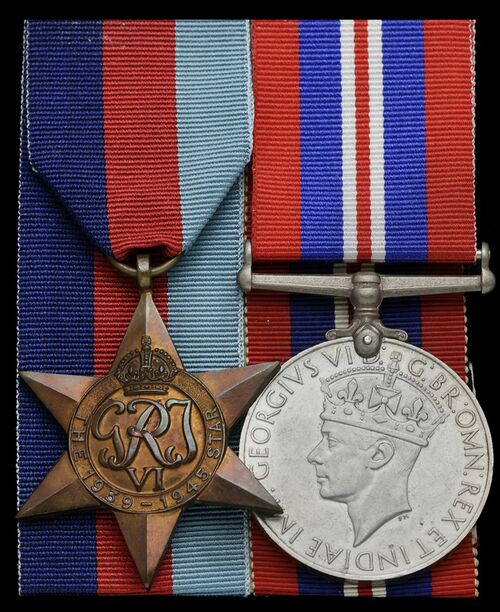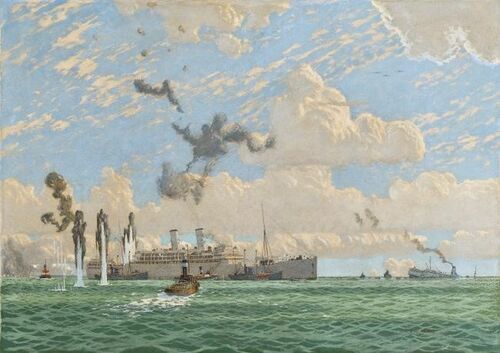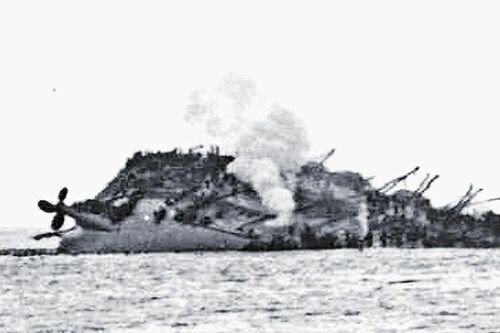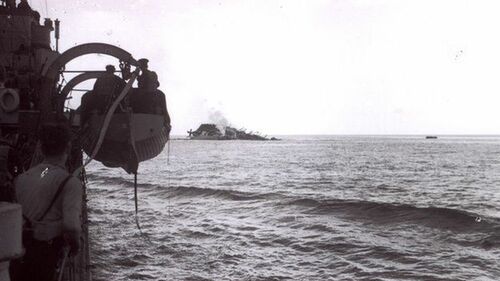Auction: 23001 - Orders, Decorations and Medals
Lot: 166
A poignant Second World War pair awarded to Private D. W. Spriddle, Royal Army Pay Corps, one of up to 4,000 people who lost their lives when R.M.S. Lancastria was bombed and sunk off St. Nazaire on 17 June 1940
It was the largest loss of life in British maritime history, greater even than the combined losses of Titanic and Lusitania
Having taken a direct hit, Lancastria capsized in about 20 minutes, and those who managed to get clear were machine-gunned by the Luftwaffe in the water, whilst many more succumbed to thick oil fuel, much of which was set ablaze by incendiary bullets
Such was the scale of the disaster that Churchill ordered a media blackout and it was full five weeks before reports of the incident started to appear in The New York Times
1939-45 Star; War Medal 1939-45, with named Army Council condolence slip, nearly extremely fine (2)
David William Spriddle was born in 1917 at St Germains, Cornwall and upon the outbreak of the Second World War was serving in France with the Royal Army Pay Corps.
Loss of the Lancastria
Much has been written about the disaster that occurred off St. Nazaire on 17 June 1940, but by way of summary, the following extract is taken from Charles Hocking's Dictionary of Disasters at Sea:
'On 17 June 1940, the Cunard White Star Line's S.S. Lancastria, Captain J. Sharp, was lying off St. Nazaire takin on board British troops who were being evacuated from France. The embarkation began at 8 a.m. and continued until 4 p.m., by which time the liner was ready to weigh anchor. In addition to the soldiers there was a small party of civilians, and their wives and children. As far as can be ascertained there were 5,310 persons on board, of whom 300 were crew.
The first attack by aircraft came about 2 p.m., followed after a short interval by a second raid. In these attacks the Orient liner Oronsay was hit and damaged but still remained seaworthy.
At about 4.30 p.m., in a third attack, the ship was struck by a salvo of bombs, one of which passed right through the dining saloon and burst in the engine room. The damage to the Lancastria was vital and she took a heavy list, and although the boats were got out with all possible speed it was evident from the outset that there was no hope of rescue for thousands of those on board. Only two lifeboats managed to get away, the others capsizing owing to difficulties with the falls or through being overloaded. Tugs and other small craft were quickly on the scene and picked up hundreds of men in the water.
The Lancastria remained afloat for barely 30 minutes, turning gradually over to port so that those still on board were able to walk upon her side as she lay. After floating in this position for some time she capsized completely and went down by the head.
Meanwhile the German airmen occupied themselves by firing from their machine-guns at the men in the water, and by firing incendiary bullets which set fire to the oil floating on the surface.
Of those on board 2,477 were saved, including Captain Sharp, who was picked up some hours later, and most of the civilian passengers. There was also a small number of people who came ashore singly or in very small parties, some of whom were captured and interned by the Germans.'
Spriddle was not amongst them but his body later washed ashore and thus he is buried in the Escoublac-La-Baule War Cemetery. He was just 22 years of age; sold together with copied research.
Subject to 20% VAT on Buyer’s Premium. For more information please view Terms and Conditions for Buyers.
Sold for
£500
Starting price
£100











